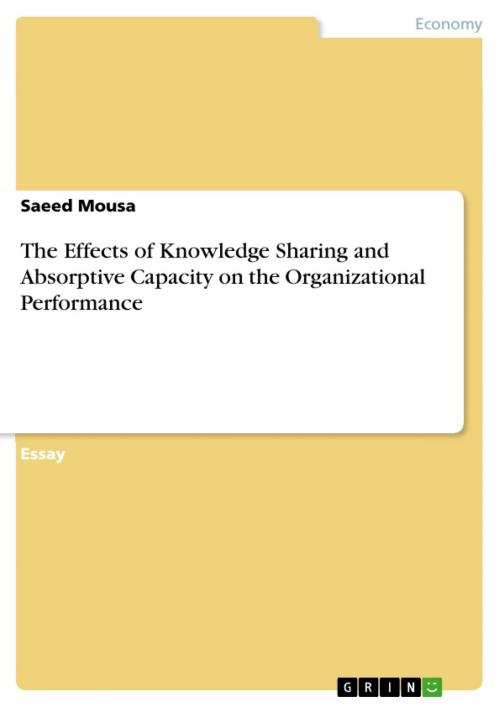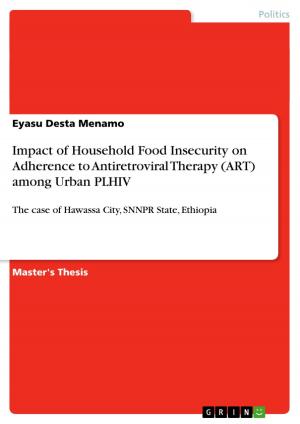The Effects of Knowledge Sharing and Absorptive Capacity on the Organizational Performance
Business & Finance, Management & Leadership, Operations Research| Author: | Saeed Mousa | ISBN: | 9783668269170 |
| Publisher: | GRIN Verlag | Publication: | August 4, 2016 |
| Imprint: | GRIN Verlag | Language: | English |
| Author: | Saeed Mousa |
| ISBN: | 9783668269170 |
| Publisher: | GRIN Verlag |
| Publication: | August 4, 2016 |
| Imprint: | GRIN Verlag |
| Language: | English |
Essay from the year 2016 in the subject Business economics - Operations Research, , language: English, abstract: Innovation does not occur on its own accord, rather, it must be triggered by varying factors. There is the need for the company or business entity to find, as well as foster talent. Additionally, non-technical innovation may be driven by managers, who mainly take the role of mentorship in the organization. This creates a relationship that acts as a driver to innovation in both the long-term and short-term. Talented managers have proper comprehension of the importance of relationships, wherein an emotional commitment of an individual to another has the capacity to make a difference. The quality of relationship between managers and employees would have a bearing on the capacity to leverage the relationship. Employees or knowledge workers are the major sources of knowledge and are crucial to the creation, capture, as well as sharing of knowledge in business entities. There are two types of knowledge, tacit and explicit. Explicit knowledge is expressed in numbers and words and can be easily shared and communicated in form of scientific formulae, hard data, universal principles and codified procedures. Tacit knowledge, on the other hand, revolves around personal and hard to formalize knowledge, which makes it extremely difficult to share or communicate with other people. It is also to be recognized that knowledge sharing is very crucial for knowledge management systems. It can be achieved through contributions, interactions, informal techniques and communal approach. There are questions about the elements that determine the absorptive capacity of a business entity. There are three groups of factors that are assumed to determine or have a bearing on the absorptive capacity. The first group, there are the research and development activities, second category are the prior related knowledge and the individual skills, and the third are the human resource management practices and the organizational structures. A business entity's knowledge base also comes as a basis for the performance of the company. This means that there exists a strong relationship between the skills associated with knowledge and the performance of the corporate entity. There is a relationship between absorptive capacity and knowledge sharing. Knowledge sharing in business entities is a critical process that requires to be attained and developed at all times so as to attain sustainable advantage.
Essay from the year 2016 in the subject Business economics - Operations Research, , language: English, abstract: Innovation does not occur on its own accord, rather, it must be triggered by varying factors. There is the need for the company or business entity to find, as well as foster talent. Additionally, non-technical innovation may be driven by managers, who mainly take the role of mentorship in the organization. This creates a relationship that acts as a driver to innovation in both the long-term and short-term. Talented managers have proper comprehension of the importance of relationships, wherein an emotional commitment of an individual to another has the capacity to make a difference. The quality of relationship between managers and employees would have a bearing on the capacity to leverage the relationship. Employees or knowledge workers are the major sources of knowledge and are crucial to the creation, capture, as well as sharing of knowledge in business entities. There are two types of knowledge, tacit and explicit. Explicit knowledge is expressed in numbers and words and can be easily shared and communicated in form of scientific formulae, hard data, universal principles and codified procedures. Tacit knowledge, on the other hand, revolves around personal and hard to formalize knowledge, which makes it extremely difficult to share or communicate with other people. It is also to be recognized that knowledge sharing is very crucial for knowledge management systems. It can be achieved through contributions, interactions, informal techniques and communal approach. There are questions about the elements that determine the absorptive capacity of a business entity. There are three groups of factors that are assumed to determine or have a bearing on the absorptive capacity. The first group, there are the research and development activities, second category are the prior related knowledge and the individual skills, and the third are the human resource management practices and the organizational structures. A business entity's knowledge base also comes as a basis for the performance of the company. This means that there exists a strong relationship between the skills associated with knowledge and the performance of the corporate entity. There is a relationship between absorptive capacity and knowledge sharing. Knowledge sharing in business entities is a critical process that requires to be attained and developed at all times so as to attain sustainable advantage.















